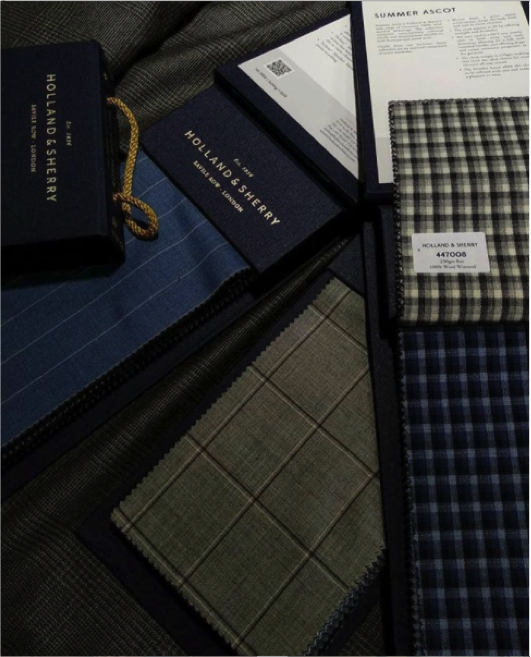Choosing your cloth
We have previously discussed the different elements that make up a bespoke suit or garment on this blog: the style, the fit, the cloth. Over the next few weeks we will be going in depth with each of these three elements and guide you through the bespoke process.
Let’s first talk about cloth. This is often the hardest part of getting a bespoke garment made. The fit is the responsibility of the tailor and the color and style is often easier to get a good sense of. Cloth however can be tricky. When you buy a suit off the rack you might have felt the cloth and thought that it was nice and soft. But have you ever thought of how it would drape on your body? How certain fabrics wear with time? Breathability?
The right cloth depends completely on your preference and the role the bespoke garment is going to play in your wardrobe. It might be helpful to ask yourself some of the following questions when going through cloth options:
· Where do I plan on where this suit? Formal occasion, business setting, informal occasion?
· Is this going to be an event piece or is it going to be for everyday wear?
Both of these questions are important as they have different requirements for the durability of the cloth you choose. If you are looking for a formal garment or maybe just for a special event, then you can easily choose a lovely soft and luxurious feeling fabric such as a Super 160. The number (160) refers to the number of threads per square inch within a fabric. Smaller and finer fibres will take up less space, leaving more room for more threads and therefore a higher thread count. A higher thread count will therefore often mean a more glossy, soft and fine fabric. However, because the fibres will be smaller there is also a higher risk of breakage. Keeping that in mind, one might want to go with a slightly lower thread count to achieve a more durable garment. Read more about how we at Su Misura Bespoke help you through these decisions!
· Does this mean that an everyday suit has to be coarse?
Not at all! The thread count is a rule of thumb more than anything. In the world of luxury cloth there is no uniformity or universal standard for how to measure thread count. That means that you can find Super 120’s that are amazingly soft, glossy AND durable, where some mills might produce a Super 180 cloth that feels the same or even less soft. Ask your tailor what they recommend if you are looking for soft, gloss and durable.
· Do I live somewhere especially warm/cold?
Su Misura Bespoke is located in Edmonton Alberta so we understand all about being comfortable in your suit no matter the temperature! While no suit will be able to keep you warm during -35 winter days, there are definitely cloths that are better suited for the cold than others. A thicker wool fabric will be better a keeping you warm than say a thinner linen fabric, as will a flannel fabric. Bamboo fabric is a newer more sustainable option and is very good at insulating your body heat in wintertime while simultaneously being breathable in the summer time. Overall though, natural fabrics such as wool and silk are excellent at being both breathable and keeping you warm depending on the temperature.
· What will I wear this garment with?
This is relevant for bespoke suits as well as individual bespoke garments such as vests, pants, and jackets. Will you be wearing a three-piece suit and a pocket square and tie? Or do you want to be able to mix and match your pieces? While fashion rules are meant to be broken, it might be worth considering how your favourite wool trousers will work with a linen blazer. Or how the blazer in a thicker flannel will look with a pair of jeans compared to a Super 140 wool blazer.
In short, there is not real right answer to what the right cloth is for you. There are however different options available that all bring something different to the table. Consider your needs, consider what is most important to you, and ask your tailor all the questions you need to pick the cloth that is going to compliment the style and the fit of your bespoke suit.
To learn more, book an appointment with us for your own design consultation here.


